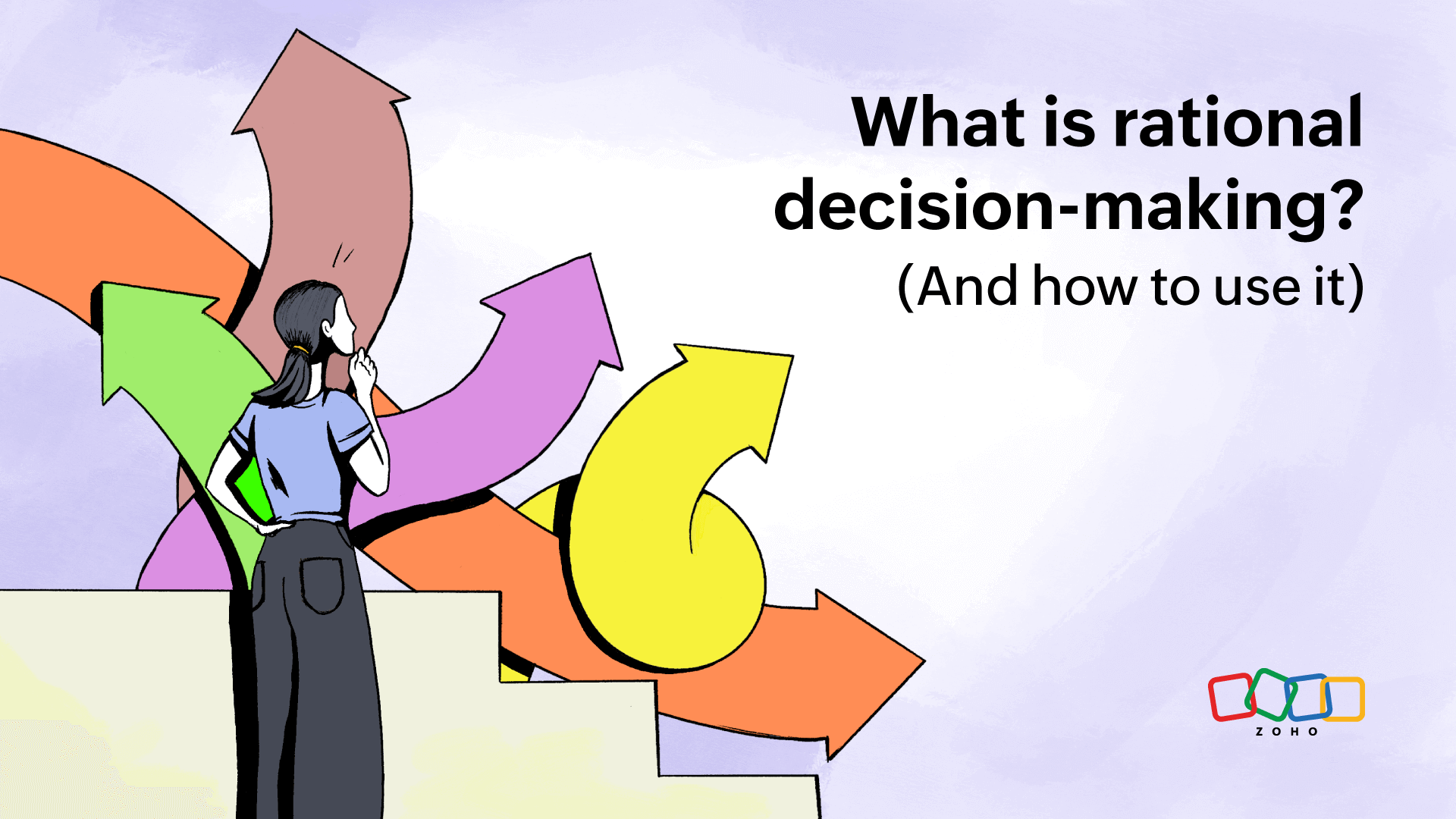- HOME
- All Topics
- Thought Leadership
- What is rational decision-making? (And how to use it)
What is rational decision-making? (And how to use it)
- Published : November 29, 2024
- Last Updated : March 19, 2025
- 2.9K Views
- 6 Min Read
What kind of problem-solver are you? Are you the type to pull up charts, statistics, and a multi-step plan before you even consider a solution? Or do you go with your gut, commit to making changes as you go, and hope for the best?
The first type engages in at least some aspects of rational decision-making, using reason and logic to guide their choices.
Here’s what that means—and how you can make your next big decision a little more rational.

What does “rational” mean?
When something is said to be “rational,” that means it involves reason and logic. Reason is the ability to look at information and draw logical conclusions from it. A logical conclusion is one that’s valid and true. That means it’s verifiable, replicable, and testable.
Here’s how reason and logic are used together to make rational decisions:
Imagine a wall, and that it’s your job to check on that wall once a day.
At 9:00 am on day 1, that wall is red.
At 9:00 am on day 2, that wall is blue.
There is a bucket of blue paint at the foot of the wall.
By using logic, you can conclude that the paint was used to paint the wall blue—rather than the wall mysteriously changing color through some other means. From there, you might use reason to determine that someone came to paint the wall while you were away from it.
Rational decision-making vs. irrational decision-making
While a rational decision is based on reason and logic, an irrational decision might be based on emotion, instinct, and similar sources. Let’s take the example of that wall again to highlight the difference between these two.
If you needed to make sure that no one could paint the wall again, you might decide to put a fence around the wall. Because that decision is based on the information you have available—and you used logic and reason to make valid conclusions from this information—you can say it’s a rational decision.
An irrational decision might be to grab a bucket of red paint and paint the wall red again. While this solves the problem of the wall being blue, it doesn’t solve the source of that problem: someone coming in to paint the wall while you’re away from it. That decision might be based on anger and frustration rather than information, making it irrational.
Note that irrational decisions aren’t necessarily always incorrect, and rational decisions aren’t always correct. You might, for example, rationally decide to put a fence around the wall, only to find out later that a colleague painted the wall blue after their manager asked them to. Similarly, you might irrationally decide to shout in anger, asking why the wall is blue, only for your colleague to hear you and come inform you they painted the wall.
5 advantages of rational decision-making
Beyond the realm of thought experiments and philosophy, rational decision-making plays a key role in a business context. It’s essential for building a successful business strategy, mitigating conflicts among your workforce, and prioritizing the right projects. Here’s why.
It’s easy to explain and defend
A rational decision is naturally easy to defend because it’s backed up with logical conclusions derived from the information you have available. If a stakeholder or leader questions your decision, you typically only have to present the information you used to make that decision. With irrational decisions, you’d have a much more difficult time convincing them.
It’s testable
When you choose a course of action based on facts, you can test its impacts over time. Say you use a specific key performance indicator (KPI) to justify your decision. Checking the impact of your decision on that KPI can tell you whether that was the right decision or not.
You can iterate on a rational decision
Iteration involves repeating a process and making small changes to improve it over time. You can do the same with a rational decision. If you find that some aspect of your decision-making process is flawed, you can keep roughly the same process, only making changes to fix those flaws.
Rationality can be trained
If you want your team to make better decisions, you can help them learn to use reason and logic. If you base your decisions on gut instincts and personal experience, you’ll have a harder time teaching these lessons to your team.
It helps you consider all the angles
Because rational decision-making is based on information, you need to go out of your way to find all the data that’s related to your decision. This can help you consider perspectives you’d have missed otherwise.
5 challenges of rational decision-making
While rational decision-making always seems better on paper, there are some reasons why it isn’t always the best approach. Or, at the very least, why it can be challenging to implement in every situation.
“Rational” doesn’t always mean “correct”
Rationality is often used interchangeably with words like “correct,” but they aren’t interchangeable. Just because a decision is rational doesn’t mean it’s correct. Whether it’s due to a flaw in your logic, a missing piece of information, or factors completely beyond your control, a rational decision could be the wrong decision. Sometimes trusting your gut can lead to a better outcome.
Rational decisions take time
Sometimes, you need to make a decision quickly. A rational decision might involve gathering information, asking questions, and reviewing similar situations to the one you’re dealing with. In some situations, you won’t have nearly enough time to do all of this. You’ll either have to make a rational decision based on limited information or base your decision on instinct.
Rationality doesn’t always lead to the same conclusions
The same set of information can lead to two different decisions, even if they’re both rational. That’s because most of the decisions you make in a business context are complex, involving a ton of information. Even a slight difference in perspectives can lead to completely different logic, resulting in different decisions.
Rational decisions can be skill-heavy
Gathering data and information isn’t necessarily difficult, but analyzing it all can be. If you don’t have the necessary skills to go through all of the data needed to make a rational decision, then it can be difficult to draw all of the conclusions you need to make that decision.
Many decisions are emotional
Logic and reason are incompatible with emotion. But when you’re faced with a serious conflict or an important decision, it can be difficult to keep emotion out of it. In these situations, making a rational decision can feel impossible.
5 tips to make more rational decisions
Want to inject more logic and reason into the decisions you make every day? Here are some simple tips for getting you there.
Practice logic and reason
Logic and reason don’t come naturally to everyone. The best way to develop these skills? Develop your critical thinking skills by looking back on decisions you or others have made and breaking down their logic. What information was used to make them? Would you have made the same decision with the same information? Why or why not?
Read broadly
Philosophy, economics, and anthropology are just a few examples of topics where rationality, logic, and reason are essential. By reading books, articles, and journals from trusted experts in these fields, you’ll be exposed to rational arguments, decisions, and more.
Start small
If you want to make more of your own decisions rational, try to apply logic to smaller decisions you make every day, even if they’re small ones. Something as simple as what you eat for breakfast can be a great way to test the way you use logic and reason. Do you typically choose your breakfast for a logical reason? Or do you just grab whatever you see in the pantry? Going through these decisions and breaking them down into the pieces of information you use to make them is great practice. No need to make that important work project your first experiment in rational decision-making.
Build up necessary skills
Skills like data analysis and communication are essential for rational decision-making. They allow you to get more of the information you need, have a clearer understanding of any data you use, and build stronger logical chains. You can train these skills by meeting with experts at your workplace, reading books, or even taking courses on these topics.
Test your decisions
If you never look back on decisions you’ve made, you’ll have a hard time improving on the next one. Go back and look at the impact of any decisions you tried to make rationally. Did the results match your expectations? Why or why not? What could you have done differently?
Make better decisions
While rationality isn’t a magic bullet that will make every decision the correct one, it will give most of them a better chance of being right. Just remember that they can take time, rely on a lot of data, and require that you put your emotions aside. But if you can do that, you’ll find that logic and reason are great allies even in the most complicated situations.
 Genevieve Michaels
Genevieve MichaelsGenevieve Michaels is a freelance writer based in France. She specializes in long-form content and case studies for B2B tech companies. Her work focuses on collaboration, teamwork, and trends happening in the workplace. She has worked with major SaaS brands and her creative writing has been published in Elle Canada, Vice Canada, Canadian Art Magazine, and more.


